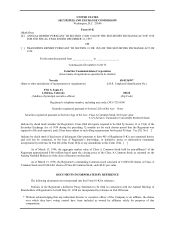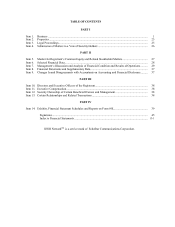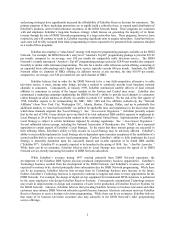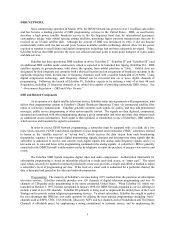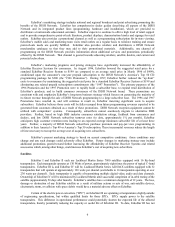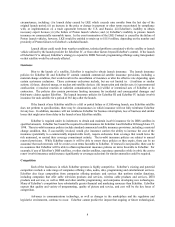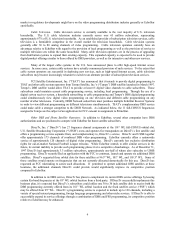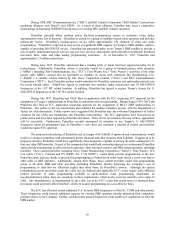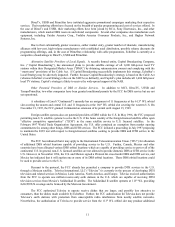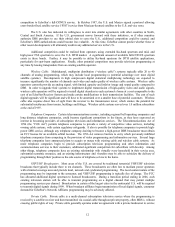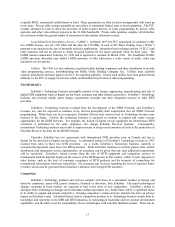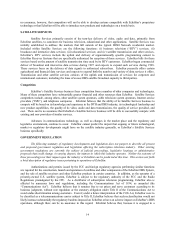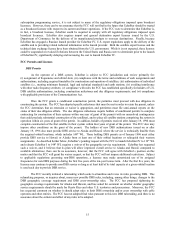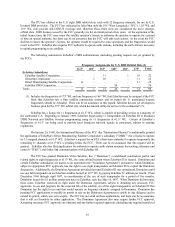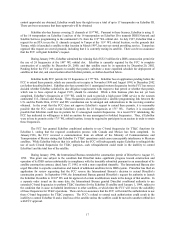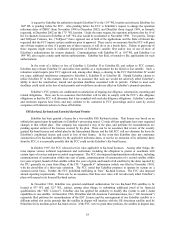Dish Network 1997 Annual Report Download - page 10
Download and view the complete annual report
Please find page 10 of the 1997 Dish Network annual report below. You can navigate through the pages in the report by either clicking on the pages listed below, or by using the keyword search tool below to find specific information within the annual report.8
circumstances, including: (i) a launch delay caused by LKE which exceeds nine months from the last day of the
original launch period; (ii) an increase in the price or change in payment or other terms necessitated by compliance
with, or implementation of, a trade agreement between the U.S. and Russia; (iii) EchoStar’s inability to obtain
necessary export licenses; (iv) the failure of Proton launch vehicles; and (v) EchoStar’s inability to procure launch
insurance on commercially reasonable terms. In the event termination of the LKE Contract is caused by the failure of
Proton launch vehicles, however, LKE would be entitled to retain up to $15.0 million, depending on the number and
proximity of Proton failures to EchoStar’s scheduled launch.
Launch delays could result from weather conditions, technical problems associated with the satellite or launch
vehicle utilized by the launch provider for EchoStar IV, or from other factors beyond EchoStar’s control. If the launch
of EchoStar IV is delayed, EchoStar’s strategy to expand its DISH Network programming offerings using transponders
on that satellite would be adversely affected.
Insurance
Prior to the launch of a satellite, EchoStar is required to obtain launch insurance. The launch insurance
policies for EchoStar III and EchoStar IV contain standard commercial satellite insurance provisions, including a
material change condition, that would result in the cancellation of insurance or alter the effective rate depending upon
certain customary exclusions. Those customary exclusions include, but are not limited to: (i) military or similar
actions; (ii) laser, directed energy, or nuclear anti-satellite devices; (iii) insurrection and similar acts; (iv) governmental
confiscation; (v) nuclear reaction or radiation contamination; and (vi) willful or intentional acts of EchoStar or its
contractors. The policies also contain provisions limiting insurance for incidental and consequential damages and
third-party claims against EchoStar. The launch insurance policies for EchoStar III and EchoStar IV include in-orbit
insurance for each satellite for a period of 365 days after the launch.
If the launch of any EchoStar satellite is a full or partial failure or if, following launch, any EchoStar satellite
does not perform to specifications, there may be circumstances in which insurance will not fully reimburse EchoStar
for any loss. In addition, insurance will not reimburse EchoStar for business interruption, loss of business and similar
losses that might arise from delay in the launch of any EchoStar satellite.
EchoStar is required under its indentures to obtain and maintain in-orbit insurance for its DBS satellites in
specified amounts. EchoStar has bound the required in-orbit insurance for EchoStar I and EchoStar II through June 25,
1998. These in-orbit insurance policies include standard commercial satellite insurance provisions, including a material
change condition, that, if successfully invoked, would give insurance carriers the ability to increase the cost of the
insurance (potentially to a commercially impracticable level), require exclusions from coverage that would leave the
risk uninsured, or rescind their coverage commitment entirely. The in-orbit insurance policies are subject to annual
renewal provisions. While EchoStar expects it will be able to renew these policies as they expire, there can be no
assurance that such renewals will be at rates or on terms favorable to EchoStar. If renewal is not possible, there can be
no assurance that EchoStar will be able to obtain replacement insurance policies on terms favorable to EchoStar. For
example, if any of EchoStar’s DBS satellites, or other similar satellites, experience anomalies while in orbit, the cost to
renew in-orbit insurance could increase significantly or coverage exclusions for similar anomalies could be required.
Competition
Each of the businesses in which EchoStar operates is highly competitive. EchoStar’s existing and potential
competitors include a wide range of companies offering video, audio, data, programming and entertainment services.
EchoStar also faces competition from companies offering products and services that perform similar functions,
including companies that offer cable television products and services, wireless cable products and services, DTH
products and services, as well as DBS and other satellite programming, and companies developing new technologies.
Many of EchoStar’s competitors have substantially greater financial and marketing resources than EchoStar. EchoStar
expects that quality and variety of programming, quality of picture and service, and cost will be the key bases of
competition.
Advances in communications technology, as well as changes in the marketplace and the regulatory and
legislative environment, continue to occur. EchoStar cannot predict the impact that ongoing or future technological,

